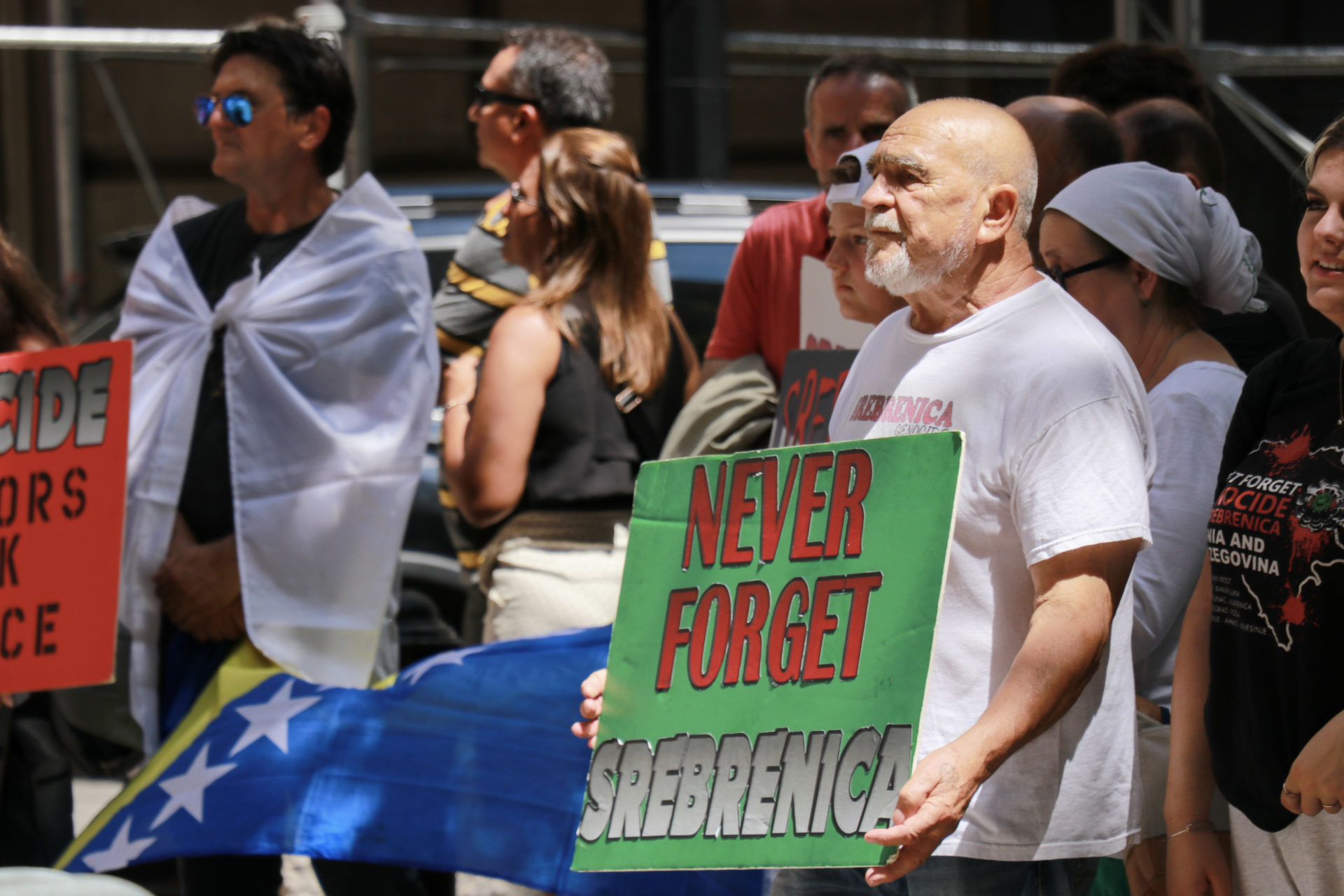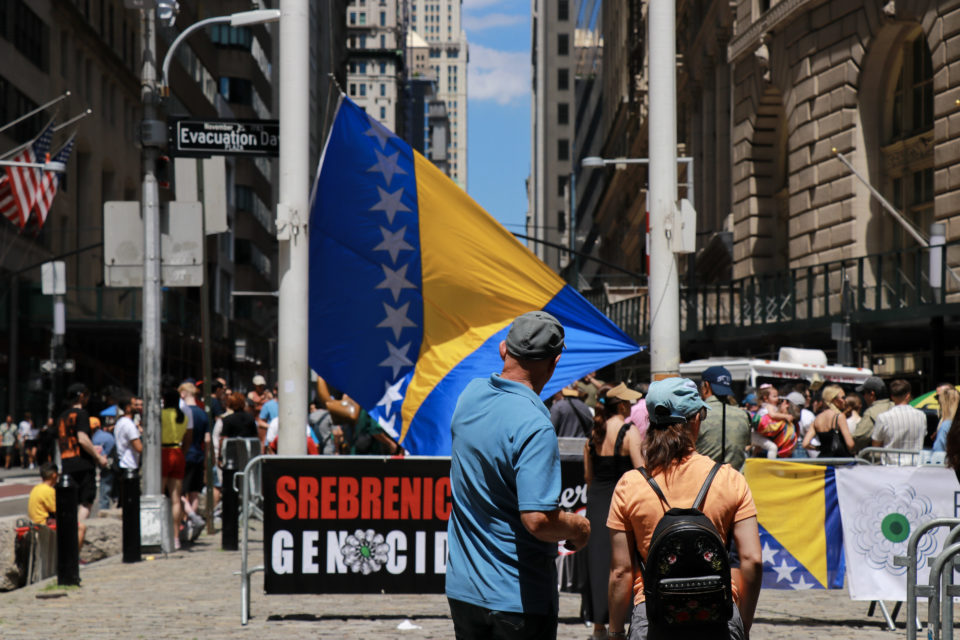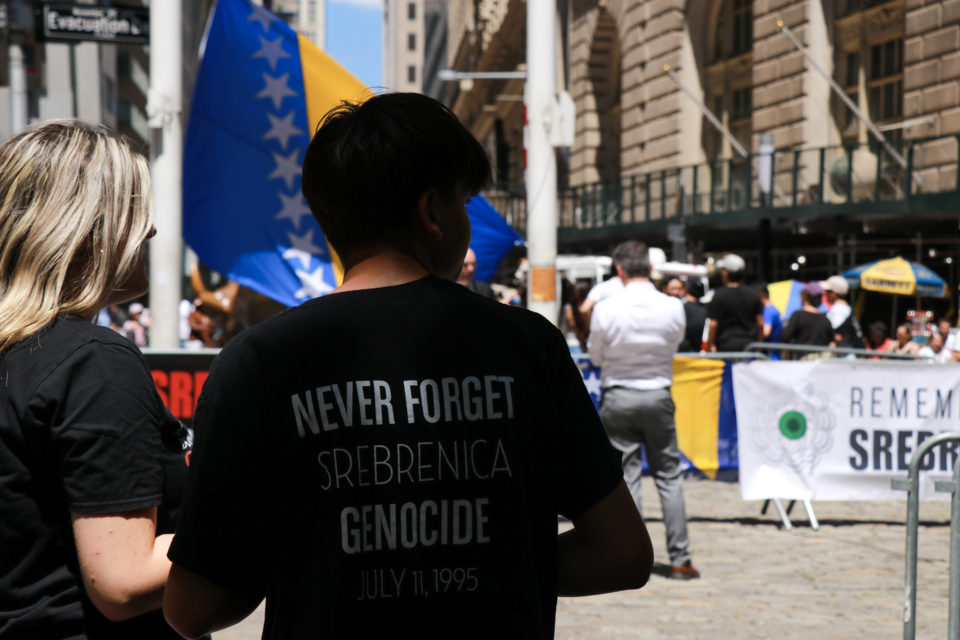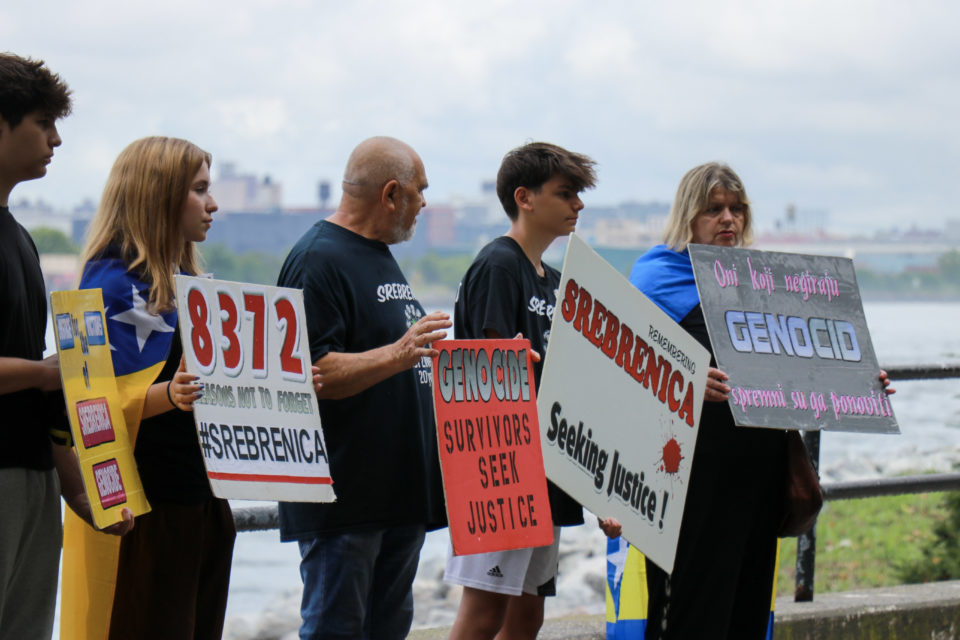
11 July, 2024 marked twenty-nine years since the Srebrenica genocide.
In cities worldwide, people from Bosnia and Herzegovina (BiH) and their allies gathered to commemorate the systematic killing of over 8,000 Bosniak men and boys – the largest mass murder in Europe since World War II. New York City (NYC) was one city where a commemoration of Srebrenica took place. Here, commemorative events hold particular significance given that Manhattan is home to the United Nations (U.N.) headquarters. Yet, despite its presence in NYC, the U.N. did not take visible steps to publicly commemorate the genocide. As in past years, the entirety of commemorative events were organised by New York’s Bosnian Islamic community.
Memorialization can be an important tool for fostering dialogue around broader topics. In the case of Srebrenica, some of these broader topics can include themes like genocide awareness and prevention, especially when affected communities are centered in these efforts. Yet, this seemingly simple undertaking is something that has been overlooked many times in the past, and in the case of commemoration of the war in Bosnia, something that the international community fails to do even to this day. There remains the question of how to ensure the right voices are heard when memorialising atrocities like Srebrenica. Moreover, what role, if any, should international organisations play in this memorialization?
NYC boasts a large Balkan diaspora, most of which arrived during the 1990s war. People from BiH specifically are estimated to be around 10,000 in population (BHICNY). Their size may be small in proportion to the population of New York City as a whole (8.3 million, United States Census Bureau), but their active presence is undeniable. Throughout the five boroughs, the community can be observed through the presence of Balkan grocery stores, butchers’, restaurants, cultural centres, and of course religious institutions, where people from BiH of all walks of life gather to preserve the culture of their homeland.

Despite the 7,223 km that separate people from BiH in New York from Srebrenica, there is never a shortage of commemorative events. All New York-based events are organised by the local community, namely the Bosnian Herzegovinian Islamic Center (BHICNY) located in Long Island City, Queens. Senad Ahmetović, a long time member of the board of directors at BHICNY, believes it’s the duty of the Islamic community to take initiative in event organisation, as they have been doing for almost two decades. Ensuring the events recount historical truth and raise awareness about the genocide is something that Ahmetović and others echoed in interviews and at the events themselves.
“The primary goal [of the events] is to raise awareness to our neighbours, people who live in the city, and a wider audience so that something like this does not repeat and doesn’t happen ever again,” Ahmetović stated, adding, “it is important that people are aware, that they’re aware of how things get started. You may not recognize it – its beginnings – but genocide does not start with the killings. It has early warning signs, and we try to make people aware of that.”
The first of this year’s events hosted by BHICNY was a flag raising that occurred on 11 July at Bowling Green Park in Manhattan. The event was opened by Dr. Damir Huremović, the board chair of BHICNY and included addresses from Ibrahim Kurtulus – Bowling Green Association, Deanna Logan – Director of Mayor Eric Adam’s Office of Criminal Justice (MOCJ), Dr. Sabahudin ef. Ćeman – Grand Mufti Islamic Community of North American Bosniaks, and Dr. Zlatko Lagumdźija – Ambassador of the Bosnian mission to the UN. Despite the heatwave New York was experiencing at the time, the event still attracted a notable crowd. The speakers took turns addressing the crowd, sharing similar sentiments around the importance of commemoration efforts to help raise awareness and prevent atrocities like this from occurring again. Speakers from the Bosnian community also took on the role of sharing their personal experiences from the war and sharing stories of those lost in Srebrenica.
The flag raising was followed by a prayer, hosted by BHICNY at their Mosque in Long Island City. The final event of the peaceful park walk – usually the largest annual event – was smaller than usual this year due to heavy rain. Nevertheless, a crowd from the community still gathered to commemorate the atrocities that were committed in Srebrenica.

The New York commemorations effectively honoured the victims and acknowledged their suffering, while raising awareness about the Bosnian War to those outside the community. The events placed great emphasis on reconciliation among affected communities, while also advocating for justice for the victims and their families.
Reckoning with the past for future’s sake
The need for continued memorialization is rendered all the more crucial, given the failures of the United Nations to prevent the atrocities committed in Srebrenica and more broadly across Bosnia and Herzegovina during 1992-1995. Indeed, this painful history makes the UN’s absence at NYC commemorations all the less explicable. Their absence does bring into conversation what memorialization should look like within the Bosnian diaspora and what role international organisations should play within it. Sarajevo-born political analyst Jasmin Mujanović stated, “I think there is a definite, definite need for memorialization, education, and real institutional reflection by the U.N. as an organisation about how it is that it became party to the horrors in Bosnia and then also Rwanda. At the same time, I don’t think the U.N. as an institution – and it’s such a bizarre kind of machine – I am not quite sure what could even be reasonably expected of them beyond what we have right now. I think the more disturbing feature of all of this is the extent to which there continues to be a very significant degree of ignorance about the events in Bosnia and the genocide in Bosnia by large segments of the international community.”
The continued missteps of international actors speak to the importance of placing affected communities at the centre of memorialization efforts. When memorialization efforts are led by their respective communities, it ensures the integrity of the events being commemorated. Those who endured the events understand the suffering they and their community have experienced and are uniquely equipped to convey this to the world. Memorialization may be a considerable undertaking for diaspora communities, but communities like the one in New York perfectly exemplify the committed and persistent efforts of Bosnians worldwide. As Mujanović reflected, “You start looking at these things through the prism of what you want to pass on to your children and the relationship you want them to have with a place like Bosnia. I wanted them to understand the war, but also to see Bosnia as a place of happiness, joy, and possibility” Ahmetović shared a similar sentiment, emphasizing the importance of passing on an understanding of what happened to his children: “My personal goal is for my two daughters to know what happened, why it happened, and to raise their consciousness to a level that makes them the generation that can help prevent future genocide. That’s my hope, and that’s what’s at stake.” Through the dedication of Mujanović, Ahmetović, and others alike, the atrocities of Srebrenica and Bosnia will remain etched in the collective memory of diaspora communities, preserving the legacy of conflict for generations to come.







